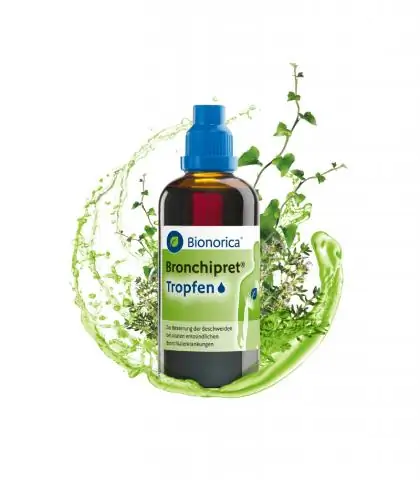- Author Rachel Wainwright [email protected].
- Public 2023-12-15 07:39.
- Last modified 2025-11-02 20:14.
Licorice root syrup
Licorice root syrup: instructions for use and reviews
- 1. Release form and composition
- 2. Pharmacological properties
- 3. Indications for use
- 4. Contraindications
- 5. Method of application and dosage
- 6. Side effects
- 7. Overdose
- 8. Special instructions
- 9. Application during pregnancy and lactation
- 10. Use in childhood
- 11. For violations of liver function
- 12. Drug interactions
- 13. Analogs
- 14. Terms and conditions of storage
- 15. Terms of dispensing from pharmacies
- 16. Reviews
- 17. Price in pharmacies
Latin name: Glycyrrihizae radicis syrup
ATX code: R05CA
Active ingredient: licorice roots (Radices Glycyrrhizae)
Producer: Moscow pharmaceutical factory (Russia), Krasnodar pharmaceutical factory (Russia), Omsk pharmaceutical factory (Russia), Flora Kavkaza (Russia), Samaramedprom (Russia)
Description and photo update: 2018-22-10
Prices in pharmacies: from 15 rubles.
Buy

Licorice root syrup is a herbal preparation with an expectorant effect.
Release form and composition
Dosage form of release - syrup: thick, brown in color, with a sweet taste and a peculiar smell (in bottles of 100 g, in a cardboard box 1 bottle).
Composition of 100 mg syrup:
- active substance: thick extract of licorice root - 4 mg;
- auxiliary components: sugar syrup - 86 mg; 95% ethanol - 8.7 mg; purified water - up to 100 mg.
Pharmacological properties
Pharmacodynamics
Licorice root syrup has an expectorant effect, which is mainly due to glycyrrhizin, which leads to an increase in the secretory function of the mucous membranes of the upper respiratory tract.
Indications for use
Licorice root syrup is prescribed as an expectorant in the treatment of upper respiratory tract diseases occurring with a cough, mainly in the presence of poorly separated, viscous and thick secretions, especially in children and elderly patients.
Contraindications
Absolute:
- bronchial asthma;
- gastritis;
- exacerbation of gastric ulcer and duodenal ulcer;
- fructose intolerance, sucrase / isomaltase deficiency, glucose-galactose malabsorption;
- pregnancy and the period of breastfeeding;
- individual intolerance to the components of the drug.
Relative (diseases / conditions in the presence of which the appointment of Licorice root syrup requires caution):
- liver disease;
- traumatic brain injury;
- alcoholism;
- diabetes;
- brain diseases;
- childhood.
Instructions for the use of Licorice root syrup: method and dosage
The drug is taken orally.
The recommended single dose of Licorice root syrup for children (with a frequency of intake 3 times a day):
- children under 2 years of age: 1-2 drops (after preliminary dilution in 1 teaspoon of water);
- children 2-6 years old: 2-10 drops (after preliminary dilution in 1 teaspoon of water);
- children 6-12 years old: 50 drops (after preliminary dilution in 1/4 glass of water);
- children over 12 years old: 1/2 teaspoon (after preliminary dilution in 1/4 cup of water).
The recommended single dose of syrup for adults is 1 teaspoon (after preliminary dilution in 1/2 glass of water) 3 times a day.
Duration of use is from 7 to 10 days. The need for a longer course should be discussed with your doctor.
To facilitate expectoration in the presence of poorly separated sputum, an abundant warm drink is recommended.
Side effects
Allergic reactions are possible while using Licorice root syrup.
In some cases, dyspeptic symptoms (in the form of diarrhea) may develop.
With a long course, the following side reactions are possible: hypokalemia, increased blood pressure, peripheral edema associated with impaired water-electrolyte metabolism.
Overdose
Main symptoms: increased dose-dependent side effects.
Therapy: symptomatic.
special instructions
1 drop of syrup contains 0.01 XE, 1 teaspoon - 0.11 XE.
In the maximum adult single dose - 430 mg of absolute alcohol, in 1 drop - 19 mg.
Application during pregnancy and lactation
According to the instructions, Licorice root syrup is contraindicated during pregnancy and lactation.
Pediatric use
Prescribing Licorice root syrup for children requires caution.
For violations of liver function
Patients with liver disease Licorice root syrup should be prescribed with caution.
Drug interactions
Possible combined use with other drugs used for the treatment of bronchopulmonary diseases.
Simultaneous use with drugs containing codeine, as well as with other drugs with antitussive action, is not recommended, as this can lead to difficulty in coughing up liquefied sputum.
Analogs
Analogs of Licorice root syrup are Licorice thick extract, Licorice roots, Kashlestop Licorice syrup with elderberry for a wet cough, Kashlestop.
Terms and conditions of storage
Store in a place protected from light at temperatures up to 20 ° C. Keep out of the reach of children.
Shelf life is 2 years.
Terms of dispensing from pharmacies
Available without a prescription.
Reviews about Licorice root syrup
According to reviews, Licorice root syrup is an inexpensive, natural and effective drug for treating coughs. One of its advantages is that it can be used by patients of all ages. However, it must be taken into account that the drug contains alcohol.
Not everyone likes a syrup that tastes too sweet. It is also noted that the agent has a therapeutic effect when taken at the onset of the disease.
Price for Licorice root syrup in pharmacies
The approximate price for Licorice root syrup (100 g in a package) is 30 rubles.
Licorice root syrup: prices in online pharmacies
|
Drug name Price Pharmacy |
|
Licorice root syrup syrup 100 g 1 pc. RUB 15 Buy |
|
Licorice root syrup syrup 100 g 1 pc. RUB 16 Buy |
|
Licorice root syrup syrup 100 g 1 pc. RUB 30 Buy |

Maria Kulkes Medical journalist About the author
Education: First Moscow State Medical University named after I. M. Sechenov, specialty "General Medicine".
Information about the drug is generalized, provided for informational purposes only and does not replace the official instructions. Self-medication is hazardous to health!






